|
What is it with British actors who turn to directing, make one excellent film and then pack it in and return to a career in front of the camera? Charles Laughton did it with the brilliant Night of the Hunter, Gary Oldman blew us away with Nil by Mouth, and Tim Roth showed his worth with the tough and criminally undervalued The War Zone. A key thing that also links these three titles is that the directors in question, despite their fame as actors at the time their respective films were made, did not appear in them. Whether this was Albert Finney's original intention for Charlie Bubbles, his one and only stint in the director's chair, remains uncertain, but he later expressed the view that the film could have benefitted from having an actor other than himself in the lead. I'm not so sure. This was a very personal project for Finney, as personal in some ways as the semi-autobiographical Nil by Mouth was for Gary Oldman, and much of how that is communicated lies in the nuances of Finney's excellent central performance.
Usually, I'd kick off with an outline of the plot, but what immediately struck me about Charlie Bubbles is the wit and economy with which story details are revealed, and to get across what makes the film so special from the off means that I can't really describe one thing without talking about the other. It's an approach to storytelling that doesn't crudely lay out plot and character details but that encourages us instead to absorb them from offhand conversation and what we are able to interpret from what unfolds. Take the opening sequence, in which Charlie drives up to the entrance of an exclusive-looking club in a golden Rolls-Royce coupé, then walks in with a large cigar jammed in his teeth for a meeting with two suited business advisers to discuss money matters. As his two companions dryly babble an almost incomprehensible stream of financial terminology at him, he wonders aloud if the alimony he pays to a woman named Lottie shouldn't be increased, as the sum itself, generous though his companions claim it is, was set some time ago. As the businessmen prattle on about investments and tax avoidance schemes, Charley becomes increasingly distracted by a man seated a few tables away who is loudly enjoying a meal with his companion. In the space of the few short minutes this sequence lasts, we learn that Charlie is a wealthy and successful author, that he is divorced from a woman and estranged from a son whose welfare he still cares about, that he may have to move abroad for a year soon as part of a tax-avoidance scheme, that he does not feel comfortable in such company and surroundings, and that he is somehow dissatisfied with the life he now lives, all of which is communicated in a manner that never for a second feels like forced exposition.
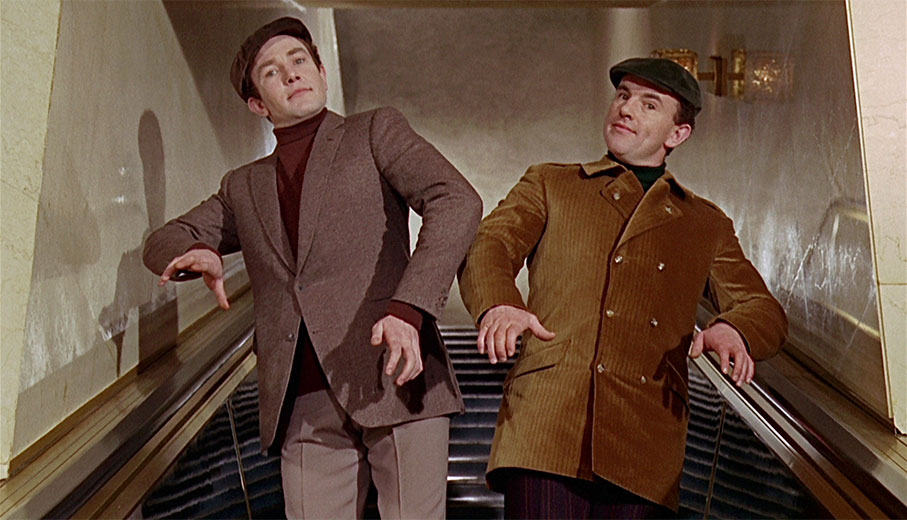
This is taken a step further when Charlie approaches the man he has been observing – whose name is Smokey Pickles and who is played by the always excellent Colin Blakely – and it immediately becomes clear that they already know each other. After exchanging pleasantries, Charlie insults Smokey, who responds by pouring a large bowl of spaghetti over Charlie's head. What follows is intriguing, as the two men engage in a food fight as formally tit-for-tat as any you'll find in the films of Laurel and Hardy. Each waits for the other to deliver his latest culinary blow before responding in kind, both appear to be stifling laughter throughout, and this increasingly messy disruption to the club's stuffy norm goes largely acknowledged by the other dinners. On one level it plays like a sequence of surreal comedy, but on another it slyly passes comment on Charlie's outsider status in a social class that would rather turn a blind eye to disruptive behaviour than acknowledge or react to it. It also tells us something about Charlie's friendship with Smokey, a man he is clearly close friends with and, we can safely presume, used to get into some serious japes with in years past. This is underlined after they depart and clean themselves up and descend a department store escalator posing as motionless showroom dummies, an image that made me roar with laughter in part because that the sort of daft thing that two close but mischievous friends would do for reasons only they understand. It's this that makes this brief shot more than a spot-on comedy moment – as these two grown men acted like piss-about teenagers to amuse no-one but themselves, it brought back a flood of memories of a close friend with whom I would engage in similar idiocy, improvising public silliness for no other reason that it tickled us to do so, and damn whatever others might have to say about our behaviour. In this small, simple moment, I understood the nature and depth of Charlie and Smokey's past friendship, something their subsequent evening of heavy drinking (when in the company of his business associates, Charlie drank only tomato juice) and its aftermath only served to confirm.
If it seems like I'm spending a disproportionate amount on time of what constitutes only a partial setup for the story proper, it's because in these opening scenes Finney the director lays out a game plan for his approach to cinematic storytelling, one that instead of spoon-feeding information about its characters allows us to feel as if we've discovered it for ourselves. This also leaves aspects teasingly open to interpretation, as when Charlie arrives home to his plush town house and is repeatedly berated for his timekeeping by testy housekeeper Mrs. Noseworthy (Margery Mason – the film is peppered with amusing surnames), whose irate protestations he observes through an elaborate closed-circuit TV system that Mrs. Noseworthy at first seems unaware of and then addresses directly to complain to her employer. This security system gives rise to a couple of the film's most interesting directorial decisions, notably the long-held shot where the arrival home of Charlie and Smokey is recorded not through traditional camera placement and editing, but on CCTV control room's monitors in a sequence that could easily have been the basis of an art installation project. It was later that I realised that only the action that takes place in this control room (where there are no cameras) is shot in the expected manner and that all subsequent activity within the house is framed from the viewpoint of the security cameras. It's a stylistic choice about which a small essay could be written (the potential subtext alone should keep you busy for a while) and gives rise to a long-held wide shot of a dining room gathering that could be comfortably slotted into A Clockwork Orange.
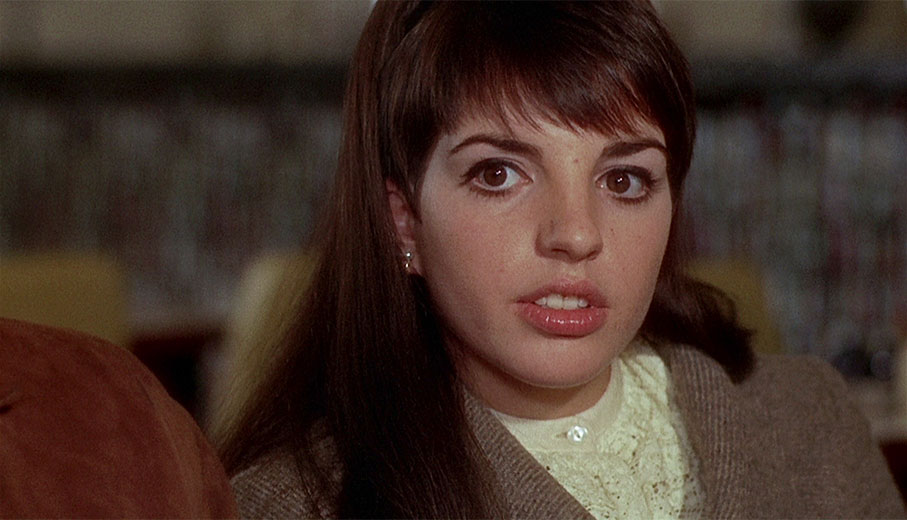
It's at the house that we meet Eliza, a young and enthusiastic American student and aspiring writer who has found temporary employment as Charlie's secretary and is played by Liza Minelli. Hang on, Liza Minelli? If you did a similar double-take to me at this news, then remember that Charlie Bubbles was made four years before Minelli's electrifying and sexually charged role as Sally Bowles in Cabaret, that she was only 21 years of age at the time and that this was her first credited feature role. And like every other role in the film she's sublimely cast, with her wide-eyed, eager-to-please but somehow innocent enthusiasm coming across as touchingly genuine, to the degree that at one stage I found myself worrying less about Charlie's wellbeing than whether Eliza's devotion to him was going to cause her emotional pain.
The main push of the story sees Charlie head up to his home city of Manchester to visit his son Jack and his long-suffering ex-wife Lottie (a typically superb Billie Whitelaw), who has used her alimony payments to relocate to an isolated countryside cottage and live a life of partial self-sufficiency. Such is the nature of the film, however, that even the journey there has its interesting asides, notably when Charlie and Eliza stop off at a near-deserted motorway services café, where they are approached by an airman on leave (Alan Lake) who recognises Charlie and is angling for a lift. Things take an altogether stranger turn when Charlie is approached by a wealthy woman from his past (Yootha Joyce), whose arrival at this location at such an ungodly hour with what looks like her whole family in tow has to be the most socially uncomfortable encounter in the film, one that has the strangely contradictory feel of a pre-planned chance encounter.
So interesting are the people that orbit around Charlie that there are times when he almost fades into the background, but crucially never does. Charlie is a man caught between two worlds, distanced by wealth, social status and location from his roots, yet still quietly yearning for life as it once was and the anonymity that his pre-fame life afforded him. His inability to resolve this conflict is perfectly captured when he takes Jack to a football match, the epitome of a working-class father/son activity of the day and one that is promisingly forwarded by a garden kick-about earlier that day. Yet having walked to the football ground as part of the throng of local supporters, Charlie then takes Jack not to the stands as expected but to the distancing confines of an executive box. It's comfortable and offers a clear view of the match, but so disconnects Jack from the rest of the supporters that it transforms what should have been an exhilarating experience for him into a sterile and ultimately boring one. As a result, Jack loses interest in the game and becomes further distanced from his father, and when a local reporter with whom Charlie went to school shows up and presses him for an interview he has no interest in giving, Jack slips away, leaving Charlie to search frantically and fret for his safety.
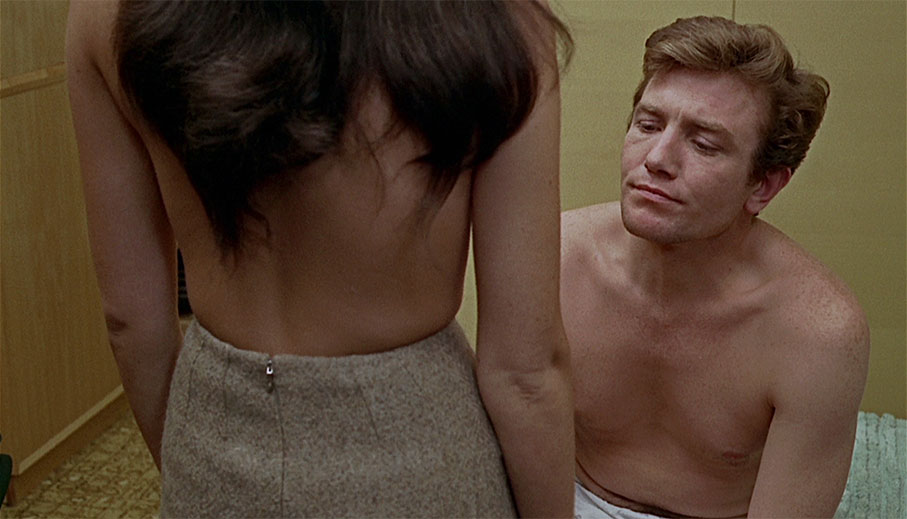
Charlie Bubbles was a very personal project for Albert Finney and there is an inescapable autobiographical air about it, both for him and (especially) screenwriter Shelagh Delaney. Like Charlie, both grew up in Manchester and went on to find fame and fortune in the arts (Delaney through her play A Taste of Honey and the film adaptation that followed). At the time of filming, Finney had an ex-wife with whom he had fathered a single child, a boy who would have been close to Jack's age. It's in Charlie's disenchantment and sense of disconnection with all aspects of his life that his story differs from Finney's, yet this aspect of the film is one of its greatest strengths. Tales of people getting rich and then realising that money doesn't make them happy are a bit too familiar (try spinning that one to the increasing number of people who are having to rely on food banks to eat), but what sets Charlie Bubbles apart is not only does it never hammer this home, it does not explicitly state that this is Charlie's problem. Would he have been happier if he hadn't found success? Probably not. Would he be more content if he turned his back on his money and fame for a simpler life? It doesn't seem likely. That certainly doesn't appear to have made Lottie happy, though how much of her constant irritability is due to Charlie's presence is difficult to say. Charlie has the countenance of someone who is searching for something indefinable that he clearly has not found, and his dissatisfaction with life makes it hard for him to now get fired up by anything. This is most clearly evident when Eliza takes her admiration of him an almost inevitable step forward and seduces him in his hotel room, something Charlie responds to with an almost mechanical lack of enthusiasm, as he fumbles with her clothing and pauses at each stage of her disrobing with a look of reluctant disinterest on his face. There's not a flicker of passion or desire to the act, which instead plays out as a cold exercise in going through the motions of an encounter that will have no emotional impact on him and will bring him little pleasure.
There's so much more to talk about with this film, but I'm already hopelessly late with this review and have other discs sitting by the TV begging for my attention. It's a work whose every scene is layered with secondary meaning and whose semi-surrealistic elements all have real-world or thematic logic at their heart. It looks consistently terrific thanks third-time-out cinematographer Peter Suschitzky (who went on to become David Cronenberg's go-to cinematographer), and there are sequences that owe their effectiveness (the discomforting creepiness of the motorway café scene is a perfect example) as much to Fergus McDonell's smart editing as Finney's canny direction. The casting is spot-on, from the lead roles to the smallest supporting character, and the performances are consistently terrific across the board. There are whole scenes when Finney the actor almost seems to be taking a back seat to let his fellow performers shine, but in his carefully judged restraint he is every bit as commanding, saying so much with just a look or a change in posture (just watch his expressions and body language during the scene in which he is seduced by Eliza) and delivering some of the most true-to-life, drunk acting I've ever seen in a film, a feat in which he is equalled by the wonderful Colin Blakely. It's a film that draws inspiration from European cinema of its day without stooping to imitation, and it never feels as anchored to its era as a good many of its contemporaries, right up to its enigmatic but oddly satisfying ending. As others have noted in this very package, there really isn't another film quite like it, and while some will doubtless be dismissive of its qualities, I have no problem admitting that I loved every pre-decimal inch of it.
A handsome HD restoration by Universal was the basis for this impeccable transfer, one whose sharpness, picture detail and contrast balance are all of the highest order. There's a slight earthy hue to the colour at times that is consistent with films of this vintage and works well for the subject matter, and the sunlit exteriors leading up to and around Lottie's cottage have a golden glow to them that showcase the transfer at its best. Almost every instance of dust, dirt and damage has been banished and there are no compression issues or signs of digital image tinkering. Lovely.
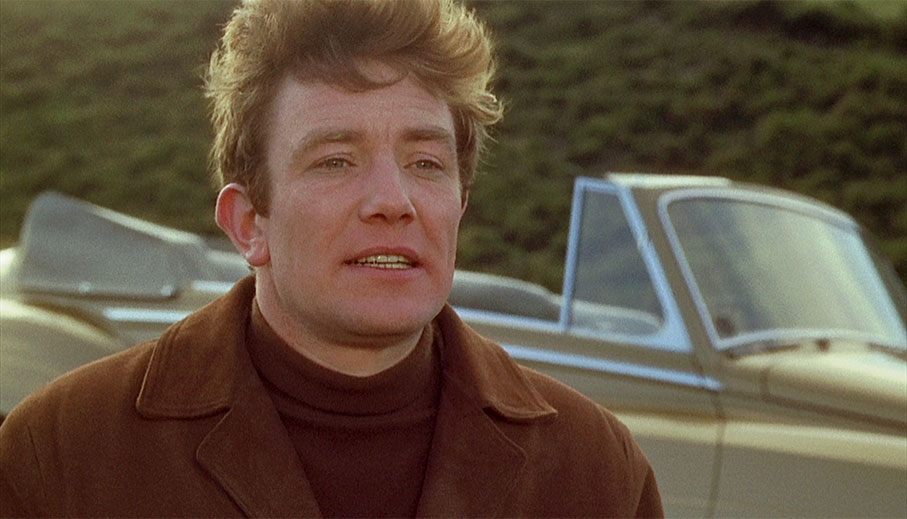
The Linear PCM 1.0 mono soundtrack is in similarly good shape, delivering clear reproduction of dialogue with only a slight treble leaning and no traces of background fluff or damage.
Optional English subtitles for the deaf and hearing impaired are available, as expected.
Audio Commentary with Thirza Wakefield and Melanie Williams
Melanie Williams, who is senior lecturer in Film and Television at the University of East Anglia and Thirza Wakefield, writer and researcher at the University of Nottingham – both of whom have a special interest in 60s British cinema – team up for one of those commentaries so packed with information and acute observations that I considered scrapping my review and advising you to listen to this instead. Both women really know their subject and have a thoughtful and perceptive appreciation for the film, its makers, its performers and its socio-political themes, and their enthusiastic scene-by-scene discussion is a pleasure and an education to listen to. Only occasionally did I come close to disagreeing with them (as someone who once worked as petrol station attendant, I was not the least bemused by the surly attitude of the one in the film), and even learned a few things that I had not picked up in my research. Excellent.
Cast and Crew Interviews
Michael Medwin: A Very Personal Film (3:22)
In a brief but still interesting chat, producer Michael Medwin recalls the rave review the film received in the New York Times, getting Liza Minelli on board ("a marvellous bit of casting") and having to improvise an ending because they originally didn't have one.
Peter Suschitzky: Down to Earth (8:35)
The film's director of photography has fond memories of the shoot, describing Finney as a generous and genial man to work with and the film itself as having a charming quality to it. He reveals that the only football match he has ever attended was the one featured in the film, that Finney relied on his assistant – a young man named Stephen Frears – to help him judge his own performance, and has some engaging stories about the final sequence, which I'm obviously not going to elaborate on.
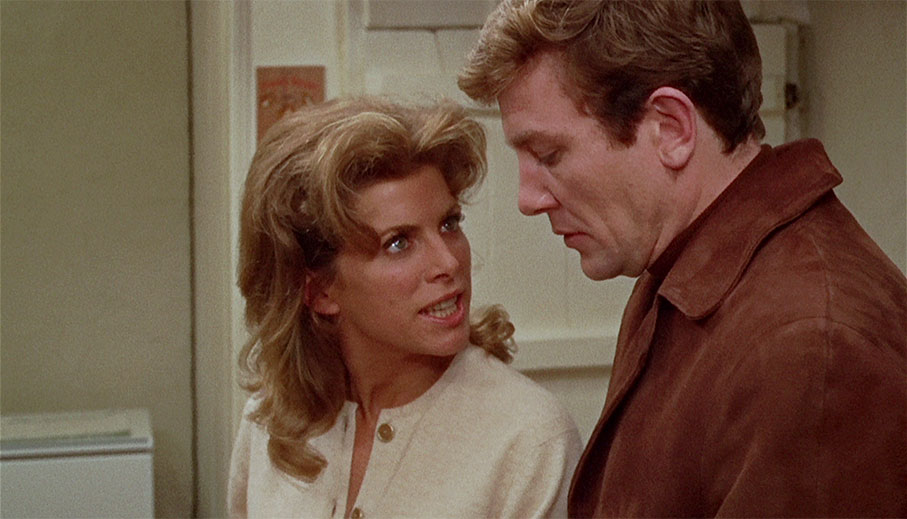
Terence A Clegg: Off the Cuff (8:47)
First assistant director Terence A. Clegg remembers being asked to work on the film after his predecessor was fired and the problems that not having been involved in the preparation work created. He reveals that Finney didn't enjoy the experience of directing but that he got on well with him, and that Stephen Frears was a great deal of help to them both. He also talks about Liza Minelli, Alan Lake (who was also Finney's stand-in), the filming of the post-food fight walk down Regent Street with hidden cameras, and – once again – that final scene.
Timothy Garland: Finney and Football (16:04)
Actor Timothy Garland, who played young Jake in the film and who never made another movie, recalls an audition that consisted of being questioned while kicking a football with Albert Finney and Stephen Frears, and shares his memories of the shoot, which are overwhelmingly positive. There are stories about shooting specific scenes, about staying with the cast and crew at the Hotel Piccadilly, and his daily rides to and from the cottage location with a variety of cast members. In common with Peter Suschitzky, he reveals that the only football match he's ever been to was the one featured in the film.
Susan Engel: Motorway Café Society (8:54)
Actor Susan Engel, who plays the family nanny in the motorway café scene, reveals that the sequence in question was shot when it was set, at a time of night when visitors (at least in those days) were few and far between. She recalls how an unplanned action by fellow actor Jean Marsh (who plays the café's sole staff member) made everyone laugh so much that it was incorporated into the film, and that Finney's direction didn't feel like direction at all. She also tellingly says, "Actors always behave like infantile idiots if you give them time off."
Misha Donat: Entirely Harmonised (14:32)
Composer Misha Donat usefully breaks down elements of his playful score for specific sequences in the film (including that final sequence – it keeps coming up), outlines some of his key influences, reveals that Finney was very hands-on when it came to the music and assures us that he didn't write the dreadful muzak heard in the hotel scenes.
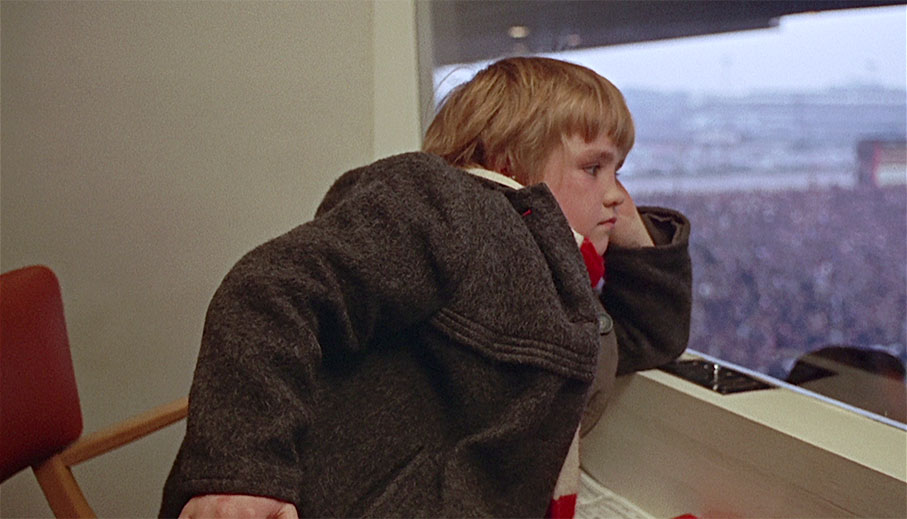
To Shape the Country (4:09)
Critic Danny Leigh provides a concise appreciation of a work he regards as "the greatest film ever made anywhere about social mobility," passing comment on its stylistic influences and its underlying themes. There are no major spoilers here (a parting comment that could theoretically qualify will only make sense to those have seen the film already) so it could be watched safely as an introduction.
Another World (21:48)
Author John Harding, whose work includes Sweetly Sings Delaney: A Study of Shelagh Delaney's Work 1958-68, provides some useful background on the writer, outlines the similarities between her professional career and that of Albert Finney and has some interesting comments about the film itself.
CCTV Test Footage (2:04)
Raw footage (without sound) of some of the shots that appear on the CCTV monitors in Charlie's house. Can also be played with captions, which put names to the faces that appear in frame.
Theatrical Trailer (2:22)
An unusual trailer that opts to sell the film on Finney's fame and the question of what sort of feature this first-time director might make.
Image Gallery
26 slides of promotional stills and publicity material. The posters are of the most interest.
The included Booklet opens (after the film credits, of course) with an essay by Thirza Wakefield, who somehow manages to explore aspects of the film not covered in the commentary (and she and Melanie Williams cover a lot of ground there), and it makes for fine reading. Next we have extracts from interviews with Albert Finney in which he talks about the film, and snippets from a 1968 interview with Liza Minelli on its making. A most welcome piece by Shelagh Delaney's daughter Charlotte on her mother and the film, of which she is a big fan, is followed by a selection of contemporary reviews; not all are positive, but those that are make for interesting reading.
1968 was a hell of a year for British cinema and saw several titles released that made their way onto my favourite films list. I may have to add another. I sat down for Charlie Bubbles convinced that I'd seen it in my younger days, and there are a couple of shots that triggered enough of a partial recall to confirm that I probably did, but it seems likely I was too young to appreciate what Finney and his collaborators had achieved. That the film wasn't a box-office hit doesn't seem that surprising, and in an archive interview in the accompanying booklet Albert Finney reveals that he never saw it as a film that would play at the Odeons of this world. Yet it's the film's refusal to go the easy entertainment route that gives it its longevity – it was made and set in 1968 but the substance of its content and the invention and restraint of its execution ensure that it doesn't feel dated. It's a perfect choice for an Indicator Blu-ray release, and this disc does it proud, with an excellent transfer and a very fine collection of extras. Highly recommended.
|